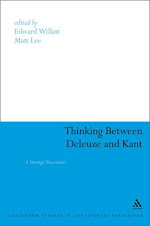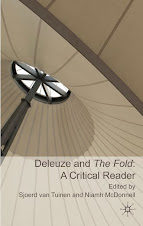Texts on Deleuze
-
- --
Derrida on Deleuze
A translation by David Kammerman of 'I'll have to wander all alone', written by Jacques Derrida in response to the death of Gilles Deleuze.
-
-
‘"Memories of a sorcerer": notes on Gilles Deleuze-Felix Guattari, Austin Osman Spare and Anomalous Sorceries' by Matt Lee
'My aim here is to introduce the philosophers Deleuze-Guattari to readers perhaps unfamiliar with their work and indicate something curious about their work, which is that it appears to have some sort of relation in a practical sense to the concept of the sorcerer ...'
-
-
'Gilles Deleuze's Bergsonian Film Project' by Donato Totaro
'Both Gilles Deleuze and Henri Bergson were, to extremely varying degrees, philosophers interested in cinema who used cinema to suit their particular intellectual needs. In the case of Bergson, he cultivated his ideas during a zeitgeist that included the invention of cinema (late 19th century). To a large extent, Bergson's philosophical ideas were shaped by the same cultural, economic, and technological climate that gave rise to narrative cinema. Deleuze on the other hand, erected a two-volume Bergsonian philosophy of cinema toward the end of the century that stands as one of the most stimulating studies of time and cinema. ...'
-
-
'Theatrum Philosophicum' by Michel Foucault
'I must discuss two books of exceptional merit and importance: Difference and Repetition and The Logic of Sense.1 Indeed, these books are so outstanding that they are difficult to discuss; this may explain, as well, why so few have undertaken this task. I believe that these words will continue to revolve about us in enigmatic resonance with those of Klossowski, another major and excessive sign, and perhaps one day, this century will be known as Deleuzian." ...'
-
-
'From comparative cultural studies to post-literary study. gilles deleuze and central-european thought. post-literature' by Constantin Severin
'During recent decades philosophy has been besieged by multicultural studies, art and literature by new theoretical challenges, and science/technology by avant-garde artistic experiments. Many thinkers seem to have been convinced that art had become inseparable from technology and information. A phenomenon of hybridization appeared, attempting to produce cultural mutation, resulted in a trans-aesthetic paradigm: post-literary studies in "post-literature." ...'
-
-
'Deleuzian Sensation and Unbounded Consciousness in Anna & Corrina Bonshek’s Reverie I (2002)' by Corrina Bonshek
'The work Reverie I (2002) by Anna and Corrina Bonshek has a special significance when considered against the philosophy of Gilles Deleuze in which he proposes the idea that art is experienced as 'sensation' (1981; 1997; Deleuze and Félix Guattari, 1994). This way of thinking about art departs from a traditional Kantian view in which art is a transcendental experience occasioned through the contemplation of form. ...'
-
-
'Notes on Desire and Pleasure' by Arianna Bove
'Certain elements of Deleuze and Guattari stubbornly retain a certain unfamiliarity. Deleuze and Guattari rescue desire from the rethoric of lack and basically remind us that desire is productive. Now with desire they use similar twists and turns of logic as Foucault does when describing power. That is why Deleuze asks in 'desire and pleasure': how can power be desired? ...'
-
-
'On Gilles Deleuze & Félix Guattari's A Thousand Plateaus' by Antonio Negri
-
-
Towards a Minor Theatre by Terence Smith
'This thesis suggests that an assessment of the political efficacy of theatre may proceed through a specification of the conditions which make the event possible and of the forms of social relations which the event practically establishes. ...'
-
-
'Immanence and Deterritorialization: The Philosophy of Gilles Deleuze and Félix Guattari' byStephan Günzel
'ABSTRACT: In academic philosophy the writings of Gilles Deleuze and Félix Guattari are still treated as curiosities and their importance for philosophical discussions is not recognized. In order to remedy this, I demonstrate how the very concept of philosophy expounded by the two contributes to philosophical thinking at the end of the twentieth century while also providing a possible line of thought for the next millenium. To do this, I first emphasize the influence of Deleuze's thinking, while also indicating the impact Guattari had on him. This account will therefore show Deleuze's attempts before Guattari to concieve of a non-dialectic philosophy of becoming. I will turn to rethink this approach given the influence of Guattari and his anti-psychoanalytic analysis of territorial processes. The result is a conception of philosophical activity as an act of 'becoming minor'.(1)'
-
-
'The Vertigo of Philosophy: Deleuze and the Problem of Immanence' by Christian Kerslake
'One of the few terminological constants in Deleuze’s philosophical work is the word ‘immanence’ and it has therefore become a foothold for those wishing to understand exactly what ‘Deleuzian philosophy’ is. That this ancient and well-travelled notion is held to have been given new life and meaning by a Deleuzian approach is evidenced in much recent secondary literature on Deleuze, and, significantly, in one central theoretical section of Hardt and Negri’s Empire, which takes up the theme of ‘the plane of immanence’. Yet on closer inspection it becomes clear that what is at stake in Deleuze’s contribution to the history of this term is actually quite elusive. I will claim here that ‘immanence’, despite appearing to connote philosophical transparency, is in fact a problem for Deleuze; indeed perhaps it is the problem inspiring his work. Not for nothing does Deleuze suggest that ‘immanence is the very vertigo of philosophy.’ ...'
-
-
'Power and Desire in the Political Ontology of Spinoza and Deleuze/Guattari' by Jan Sjunnesson
'In these preliminary notes, I want to incite a discussion on the 17th century philosopher, Baruch Spinoza, along with the contemporary French authors Gilles Deleuze’s and Félix Guattari’s joint works , that brings forth a reflection on ontology as political, constituted by powers and desires rather than a reductionist apolitical naturalism. In some sense, every philosophy of being (i.e. ontology, or the wider concpet metaphysics), has to make a place for man and his well- being in the whole of reality. That place is a political question which I do not fully answer here, neither give full account to Spinoza or Deleuze/Guattari, but only hope to open up for further theoretical reflections. ...'
-
-
'Sickness unto life - life and works of philosopher Gilles Deleuze' by Didier Eribon
'The suicide of philosopher Gilles Deleuze at the beginning of November, after he had spent many years suffering from a terrible respiratory illness, was a gesture that struck many in France dumb. Deleuze's thought, however resistant to summary, was above all an affirmation of the life force, of the will to life: "One's always writing," as he put it in Pourparler (1990 [Negotiations, 1995]), "to bring something to life, to free life from where it's trapped." While there is something tragically unbearable about the willful death of a philosopher who always, in the final instance, exalted and summoned the forces of life, it would be a mistake to see a contradiction between Deleuze's philosophy and his final, parting gesture. ...'
-
-




